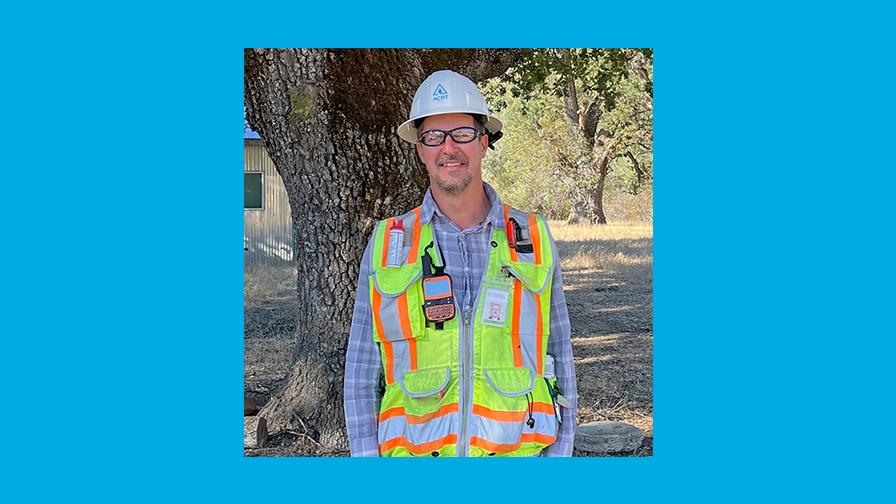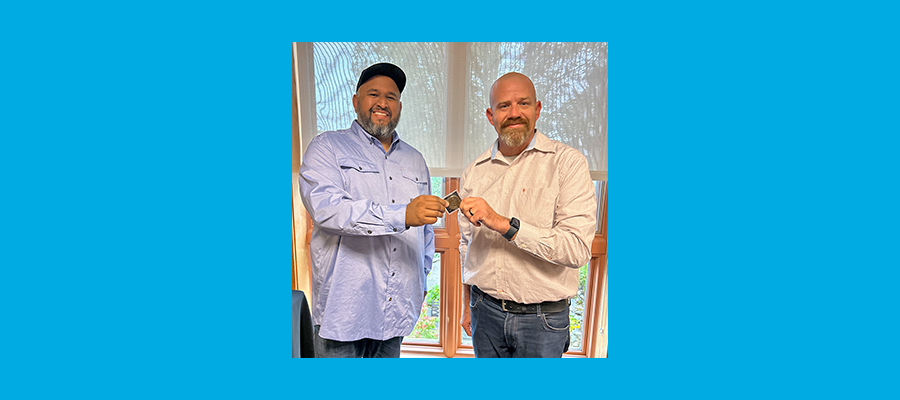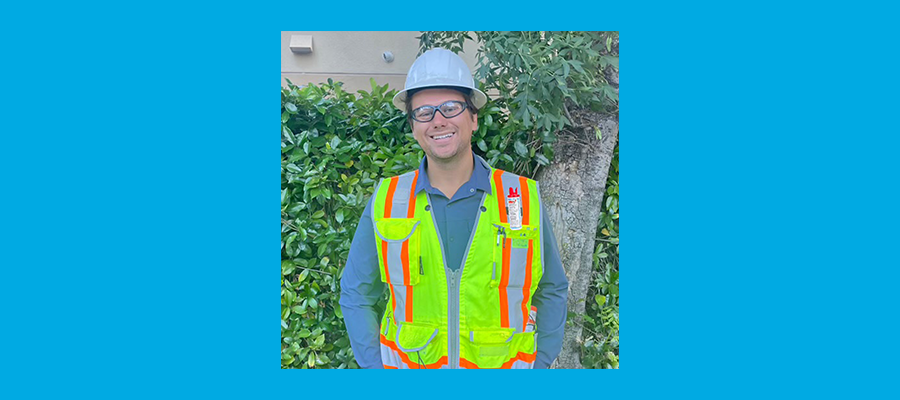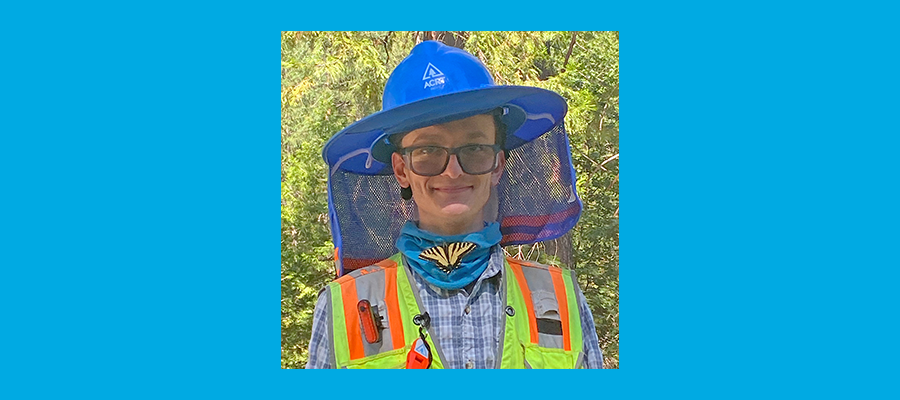- Vegetation Management Services
- In Your Neighborhood
- About
- Careers
- Webinars
- Articles
Hold Your Horses! How Safety Training and Kindness Saved the Day

Hold Your Horses! How Safety Training and Kindness Saved the Day
ACRT Pacific Vegetation Management Inspector Joseph Randolph spends hours alone each day in the Central Coast countryside, checking Pacific Gas and Electric Company (PG&E) powerlines to make sure they comply with clearance regulations.
But one morning earlier this fall, Joseph suddenly found he had company.
After notifying a private property owner in Prunedale, Calif. (Monterey County) that he would be inspecting line clearances, Joseph hiked down a steep hill through a thicket of acacia trees, willows, and poison oak.
He soon spotted a patch of what looked like brown fur.
“I couldn’t tell what it was right away, but I kept an eye on it. We have a lot of training on staying situationally aware and knowing what’s around us,” he said.
‘He needed help’
Joseph quickly realized that the patch of fur was a horse. The animal didn’t move as Joseph continued his inspections over the next 10 minutes. As he worked, Joseph noticed that the horse was up to his elbows in dry, clay-like mud, and entangled in a downed willow tree. The animal’s head hung low, and he couldn’t seem to lift it.
So, Joseph slowly approached the horse and began talking to him.
“I asked him, ‘Hey, buddy, are you OK? What are you doing down here?’ As soon as I asked him if he was OK, he swayed from one side to the other, almost like he was showing me he couldn’t move. By that point, I was pretty sure he needed help. It didn’t look like he was going to get out of there by himself.”
Joseph doubled back to the property owner’s home to begin looking for aid.
As it turned out, the horse — named Rocky — belonged to the property owner and had been missing for two weeks.
The owner, Jennifer Moore-Gardoni, was ecstatic: She’d reported Rocky stolen and had enlisted the help of the public and the Monterey County Sheriff’s Office to find him.
“She got really excited and very emotional,” Joseph said. “I felt like she needed support, so I decided I should stick around to help her stay calm as she started making calls to find help. When someone is showing anxiety, you can help relieve their anxiety a little bit by staying calm yourself, and that’s what I was trying to do.”
Joseph offered ideas on who to call and how to free Rocky, including noting that the willow tree that ensnared him would probably need to be cut down and removed.
After coming to the scene and working for more than an hour, that’s ultimately how the North County Fire Protection District of Monterey County and the American Society for the Prevention of Cruelty to Animals (ASPCA) liberated Rocky.
In a public Facebook post, Jennifer described learning that Joseph had found her horse and wrote, “Thank god for PG&E!”
Making the right decisions
Joseph’s coworkers are not surprised he knew just what to do.
For starters, he’s “just a pretty calm guy,” said Dave Rennell, an ACRT Pacific pre-inspection manager and Joseph’s supervisor. “When you talk to him, you can feel his steadying presence.”
Nor is it unusual for vegetation management inspectors to “make good catches,” said Alexandra Baldwin, a PG&E senior vegetation program manager who oversees ACRT Pacific crews, including Joseph. From rescuing residents in medical distress to assisting stalled motorists, vegetation management coworkers regularly step up to help.
“We share our safety culture at PG&E with our contract crews,” Alex said. “We work closely with them as our eyes in the field. They’re exposed to the risks out there. We start every call and every meeting talking about safety. Sometimes, that can feel repetitious, but repetition is what helps the information stay with people so that they have the tools and knowledge to react in a crisis.”
Without regular reminders, bad decisions can follow, Dave said. For example, a less-experienced person might have more quickly approached Rocky and gotten stuck in the mud himself.
“Constant safety training starts to permeate you. You carry it with you so that when something happens, you can make the right decisions,” he said.
A few days after the rescue, Joseph drove by Rocky’s home to check on the horse from a distance. He saw Rocky standing up in his corral; he also followed Rocky’s progress on Jennifer’s Facebook page and hasn’t ruled out future visits to see how the horse is faring.
“It’s been cool to see how he’s progressed.”
This article was originally published in a PG&E newsletter.
Related Articles

Join us in congratulating ACRT Pacific Operations Manager Rian Owens on being awarded an ACRT Pacific Safety Challenge Coin. ACRT Pacific Safety Manager Raul E. Perez Jr. shared the following about Owens. For years, Rian has set a standard for what it means to lead by example. As chair of our Safety Committee, Rian has[...]
Read More
We’re proud to announce that Raul E. Perez Jr. has been named ACRT Pacific’s new safety manager. Perez has been a valued member of our team since 2014 and most recently served as a contract vegetation program manager. Throughout his time with ACRT Pacific, Perez has demonstrated a strong commitment to safety, excellence, and leadership[...]
Read More
Tristan Hoffman joined the ACRT Services family of companies in 2019 and brought a wealth of knowledge and a passion for trees and nature that has been evident ever since. When asked why he chose this industry, Hoffman shares, “I love trees and nature and enjoy talking to people about their trees. I also chose[...]
Read More
Dawson Westurn’s admiration for the outdoors originated long before he found himself at Texas Tech University working toward a degree in natural resource management with a concentration in conservation science. His appreciation for all things nature developed from a young age, as Westurn’s childhood was centered around the Boy Scouts of America. Once he completed[...]
Read MoreRecent Posts
- Servant Leadership in Utility Vegetation Management 12th Nov 2025
- ACRT Pacific Honors Our Veterans 10th Nov 2025
- Rian Owens Receives Safety Challenge Coin 05th Nov 2025